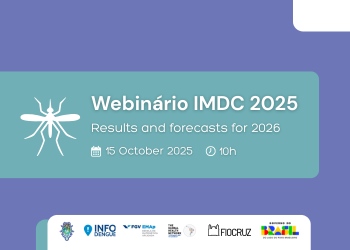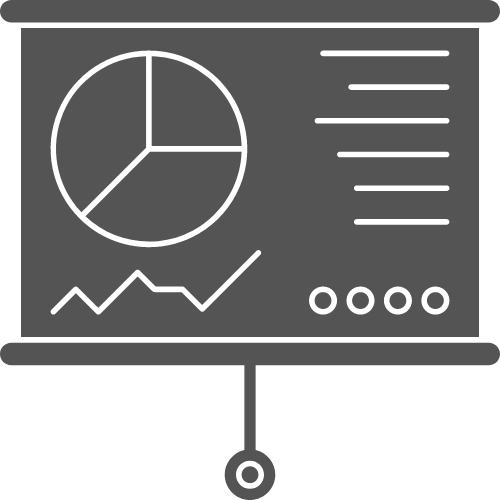

The InfoDengue–Mosqlimate Dengue Challenge (IMDC) is an international challenge launched by the InfoDengue and Mosqlimate projects, in partnership with Fiocruz and the Getulio Vargas Foundation (FGV), which has been running since 2024. The main objective of the IMDC is to integrate epidemiological, demographic and climatic information to improve the prediction of dengue epidemics and support the formulation of public health policies. The project conducted the 2nd InfoDengue –Mosqlimate Dengue Challenge, in which 52 researchers from 15 teams in South Africa, Germany, Saudi Arabia, Brazil, Spain, the United States, Italy and the United Kingdom contributed 19 dengue prediction models for all Brazilian states for the years 2025 and 2026.
The action, called Sprint, will be presented in the webinar 2nd InfoDengue–Mosqlimate Dengue Challenge (IMDC) – Results and forecasts for 2026, on 15 October 2025 at 10 a.m. (BRT). Researchers Flavio Codeço Coelho, Eduardo Araújo and Fabiana Ganem, from the Getúlio Vargas Foundation, Brazil (FGV), will present the innovative approach that aims to strengthen the accuracy of forecasts and thereby more assertively support the decisions of the Ministry of Health in the country.
Online event - 15 October 2025, 10h - 12h (BRT).
Event in English.
The project
Throughout the Infodengue–Mosqlimate Challenge, the main goal was to develop and train predictive dengue models in Brazil, providing forecasts to support monitoring and public health decision-making, while strengthening the capacity to anticipate dengue epidemics through the integration of epidemiological, climatic, and technological information.
Among the specific objectives were:
- Building a community of modellers aligned in objectives and methodology;
- Training ensemble models based on the forecasts of all participating teams;
- Continuously updating and monitoring model performance.
To support model development, the Mosqlimate platform compiled a comprehensive dataset integrating epidemiological, demographic, and climate information. A GitHub-based submission template was also provided, enabling standardised forecasts and their aggregation into ensemble models.
Speakers
Dr. Flávio Codeço Coelho (Fundação Getúlio Vargas - FGV)
Associate Professor at the School of Applied Mathematics (FGV EMAp); Principal Investigator of the Mosqlimate project.
Dr. Fabiana Ganem (Fundação Getúlio Vargas - FGV)
Post-doctor candidate at the School of Applied Mathematics (FGV EMAp); Coordinator of the Forecast Sprint of the Mosqlimate team; Epidemiologist at the Institut d'Investigació en Ciències de la Salut Germans Trias i Pujol.
Bsc. Eduardo Araújo (Fundação Getúlio Vargas)
Data scientist and project manager of the Mosqlimate project.
Agenda
October 15 2025 - 10am to 12 pm (BRT)
5 mins - Welcome and Introductions (Flávio Coelho)
30 mins - Presentation of the ensemble model (Flávio Coelho / Eduardo Araújo)
10mins - Interactive session with discussion (Fabiana Ganem)
40mins - Presentation of the teams participating in the challenge (Team leaders)
10 mins - Interactive session with discussion (Fabiana Ganem)
5 mins - Conclude session (Flávio Coelho)
Webinar resources
Recording
 Presentation slides
Presentation slides
InfoDengue-Mosqlimate Challenge 2025: Ensemble models results (Flávio Codeço Coelho)
Mini presentations - Eduardo Araújo and other Team leaders
Infodenge-Mosqlimate Sprint
The Infodengue-Mosqlimate Dengue Challenge was a collaborative initiative conducted by the Infodengue and Mosqlimate platform teams, centered around the following guiding question:
What is the expected number of probable dengue cases in the upcoming season, both for Brazil as a whole and by individual Federation Units (UFs)?
2nd IMDC Challenge results
Access the report and resources of the results of the 2nd InfoDengue-Mosqlimate Dengue Challenge.
Infodengue
InfoDengue is an arbovirus alert system based on hybrid data generated through the integrated analysis of data mined from social media and climatic and epidemiological data.
Mosqlimate Project
Mosqlimate is a multi-disease tool with two main goals:
1. Estimate probabilities of change in pattern of disease transmission in response to climate and land use changes;
2. Identify circulating viruses during outbreaks when information is incomplete.